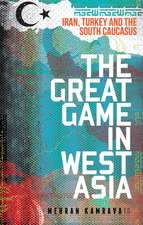Foreign Policy Responses to the Rise of Brazil: Balancing Power in Emerging States: Palgrave Studies in International Relations
Editat de G. Gardini, M. Tavares de Almeidaen Limba Engleză Hardback – 17 mai 2016
Din seria Palgrave Studies in International Relations
- 8%
 Preț: 513.54 lei
Preț: 513.54 lei - 15%
 Preț: 641.52 lei
Preț: 641.52 lei - 17%
 Preț: 360.83 lei
Preț: 360.83 lei - 20%
 Preț: 692.06 lei
Preț: 692.06 lei - 20%
 Preț: 691.18 lei
Preț: 691.18 lei - 18%
 Preț: 625.59 lei
Preț: 625.59 lei -
 Preț: 380.92 lei
Preț: 380.92 lei - 15%
 Preț: 629.52 lei
Preț: 629.52 lei - 15%
 Preț: 571.48 lei
Preț: 571.48 lei - 18%
 Preț: 931.09 lei
Preț: 931.09 lei -
 Preț: 380.92 lei
Preț: 380.92 lei -
 Preț: 382.79 lei
Preț: 382.79 lei -
 Preț: 383.74 lei
Preț: 383.74 lei -
 Preț: 387.52 lei
Preț: 387.52 lei -
 Preț: 377.72 lei
Preț: 377.72 lei -
 Preț: 384.11 lei
Preț: 384.11 lei -
 Preț: 383.16 lei
Preț: 383.16 lei -
 Preț: 379.96 lei
Preț: 379.96 lei -
 Preț: 384.70 lei
Preț: 384.70 lei - 15%
 Preț: 630.33 lei
Preț: 630.33 lei -
 Preț: 380.17 lei
Preț: 380.17 lei -
 Preț: 382.79 lei
Preț: 382.79 lei -
 Preț: 380.33 lei
Preț: 380.33 lei -
 Preț: 383.74 lei
Preț: 383.74 lei -
 Preț: 376.22 lei
Preț: 376.22 lei -
 Preț: 373.35 lei
Preț: 373.35 lei -
 Preț: 383.74 lei
Preț: 383.74 lei -
 Preț: 384.70 lei
Preț: 384.70 lei -
 Preț: 379.04 lei
Preț: 379.04 lei -
 Preț: 381.87 lei
Preț: 381.87 lei -
 Preț: 384.70 lei
Preț: 384.70 lei -
 Preț: 383.74 lei
Preț: 383.74 lei -
 Preț: 380.92 lei
Preț: 380.92 lei - 15%
 Preț: 518.14 lei
Preț: 518.14 lei -
 Preț: 377.51 lei
Preț: 377.51 lei -
 Preț: 374.69 lei
Preț: 374.69 lei -
 Preț: 376.02 lei
Preț: 376.02 lei -
 Preț: 377.13 lei
Preț: 377.13 lei -
 Preț: 382.79 lei
Preț: 382.79 lei - 15%
 Preț: 633.06 lei
Preț: 633.06 lei -
 Preț: 383.74 lei
Preț: 383.74 lei
Preț: 766.11 lei
Preț vechi: 934.28 lei
-18% Nou
Puncte Express: 1149
Preț estimativ în valută:
146.62€ • 152.30$ • 121.79£
146.62€ • 152.30$ • 121.79£
Carte tipărită la comandă
Livrare economică 03-17 februarie 25
Preluare comenzi: 021 569.72.76
Specificații
ISBN-13: 9781137516688
ISBN-10: 1137516682
Pagini: 240
Ilustrații: XIV, 239 p.
Dimensiuni: 140 x 216 x 16 mm
Greutate: 0.44 kg
Ediția:1st ed. 2016
Editura: Palgrave Macmillan UK
Colecția Palgrave Macmillan
Seria Palgrave Studies in International Relations
Locul publicării:London, United Kingdom
ISBN-10: 1137516682
Pagini: 240
Ilustrații: XIV, 239 p.
Dimensiuni: 140 x 216 x 16 mm
Greutate: 0.44 kg
Ediția:1st ed. 2016
Editura: Palgrave Macmillan UK
Colecția Palgrave Macmillan
Seria Palgrave Studies in International Relations
Locul publicării:London, United Kingdom
Cuprins
Introduction; Gian Luca Gardini and Maria Tavares de Almeida
1. Brazil: The State of the Art of its Rise and Power Projection; Gian Luca Gardini
2. Within the Region, Beyond the Region: The Role of Brazil According to the Mass Public; Maria Herminia Tavares de Almeida
3. Brazil's Rise and its Soft Power Strategy in South America; Miriam Gomes Saraiva
4. Argentina and the Rise of Brazil: Perceptions and Strategic Options; Roberto Russell and Juan Gabriel Tokatlian
5. Brazil: Chile's Mythical Ally; Joaquín Fermandois
6. Brazil as a Global Stakeholder: a View from Uruguay; Carlos Luján
7. Paraguay and the Rise of Brazil: Continuity, Resistance and Compliance; Peter W. Lambert
8. Bolivia-Brazil: Internal Dynamics, Sovereignty Drive and Integrationist Ideology; Ana Carolina T. Delgado and Clayton M. Cunha Filho
9. The Peruvian Response to the Rise of Brazil: Developing a Strategic Relationship; Ronald Bruce St John
10. Venezuela and the Rise of Brazil: Convergence and Divergence in the Chavez Era; José Briceño-Ruiz
11. Colombia's Contestation Strategies Facing the Emergence of Brazil as a Regional Power; Eduardo Pastrana Buelvas
12. Containing and Engaging: Mexico's Response to the Rise of Brazil; Ana Covarrubias
13. Latin American Regionalism Faces the Rise of Brazil; Andrés Malamud
Conclusions; Gian Luca Gardini and Maria Herminia Tavares de Almeida
1. Brazil: The State of the Art of its Rise and Power Projection; Gian Luca Gardini
2. Within the Region, Beyond the Region: The Role of Brazil According to the Mass Public; Maria Herminia Tavares de Almeida
3. Brazil's Rise and its Soft Power Strategy in South America; Miriam Gomes Saraiva
4. Argentina and the Rise of Brazil: Perceptions and Strategic Options; Roberto Russell and Juan Gabriel Tokatlian
5. Brazil: Chile's Mythical Ally; Joaquín Fermandois
6. Brazil as a Global Stakeholder: a View from Uruguay; Carlos Luján
7. Paraguay and the Rise of Brazil: Continuity, Resistance and Compliance; Peter W. Lambert
8. Bolivia-Brazil: Internal Dynamics, Sovereignty Drive and Integrationist Ideology; Ana Carolina T. Delgado and Clayton M. Cunha Filho
9. The Peruvian Response to the Rise of Brazil: Developing a Strategic Relationship; Ronald Bruce St John
10. Venezuela and the Rise of Brazil: Convergence and Divergence in the Chavez Era; José Briceño-Ruiz
11. Colombia's Contestation Strategies Facing the Emergence of Brazil as a Regional Power; Eduardo Pastrana Buelvas
12. Containing and Engaging: Mexico's Response to the Rise of Brazil; Ana Covarrubias
13. Latin American Regionalism Faces the Rise of Brazil; Andrés Malamud
Conclusions; Gian Luca Gardini and Maria Herminia Tavares de Almeida
Notă biografică
Gian Luca Gardini is Professor of International Relations and Chair of International Business and Society Relations, with a particular focus on Latin America, at Friedrich Alexander University in Nuremberg, Germany. Among his books are Latin America in the 21st Century and Latin American Foreign Policies between Ideology and Pragmatism.
Maria Hermínia Tavares de Almeida is Senior Researcher at Centro Brasileiro de Análise e Planejamento (CEBRAP) and a former Professor of Political Science and International Relations at the University of São Paulo, Brazil. Her main areas of research are public policy, public opinion and foreign policy. She is currently member of the World Bank Chief Economist´s Council of Eminent Persons.
Maria Hermínia Tavares de Almeida is Senior Researcher at Centro Brasileiro de Análise e Planejamento (CEBRAP) and a former Professor of Political Science and International Relations at the University of São Paulo, Brazil. Her main areas of research are public policy, public opinion and foreign policy. She is currently member of the World Bank Chief Economist´s Council of Eminent Persons.
Textul de pe ultima copertă
Brazil is undeniably on the rise, and its economic weight and international activism have attracted considerable attention. However, the limitations of its capacity and will to turn potential power into actual international influence are equally significant. So far, relatively little attention has been paid the diverse ways in which other Latin American countries have perceived, and responded to, the rise of Brazil. This edited volume redresses the gap by answering some crucial questions about the international relations of Latin America: what has been the real impact of the rise of Brazil on other Latin American states? What is the place of Brazil in their foreign policy? What role do extra-regional actors play? What is the weight of domestic factors? Have Latin American countries devised specific strategies to cope with the rise of Brazil? Thirteen case-study chapters answer these questions while providing thought-provoking considerations for other emerging powers and regions.













